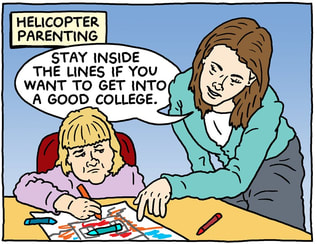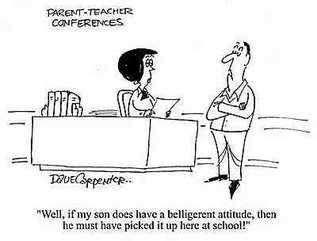| While I spend time helping students, I also spend countless hours meeting with parents of these students. I listen and understand that parenting an adolescent is a very difficult and exhausting experiences. Some parents navigate this process easier than others. Perhaps they have a personality that is easier to acclimate to the changes in the adolescent brain and body; or, perhaps they have already been through the struggles with an older child? However, not every parent (or every student) is equipped to seamlessly handle the ups and downs of adolescence and middle school issues. |

| What happens when a parent appears to NOT be operating with the mindset of ‘what is best for my child?’ What if that parent is using words like ‘support,’ ‘advocate,’ or ‘protect’ to actually smother (emotionally), control, or push their child in a direction that is unhealthy for that particular kid? How can a parent identify the difference between SUPPORT vs. SMOTHERING? |
| Supportive-Style Parenting Encouraging your child to pursue goals/dreams ------------ Teaching/building skills for: communication, problem solving, coping with life, confidence, and resilience ------------ Nurturing and Empathy ------------ Listening for Understanding ------------ Allow natural consequences to occur ------------ Discipline appropriately to teach rules and morals | Smothering-Style Parenting Forcing your child to pursue your goals/dreams for them ------------ Doing for your child: speaking for them to teachers, fixing issues, defending without facts, preventing failure and recovery. ------------ Overbearing or Clingy ------------ Speaking for your child ------------ Protecting your child from learning lessons (at school, with friends, in relationships, etc) ------------ Blaming other people for things your child does and/or enabling entitled behavior. |
The message is: Teach your child. Then, step back and let them try.

· Confidence: they tried and now they know their capabilities.
· Perseverance: they will try again (with support) to improve.
· Resilience: they won’t be defeated forever; they will get back up and try again.
· Pride: they will feel accomplished by putting forth their own effort.
· Self-Confidence: they believe in themselves to try something new or try something a different way.
· Determination: you can’t get everything right the first time or exactly the way you want it, but it is worth fighting for.
· Communication: they will learn to speak assertively to others about their needs, wants, and desires.
· Emotional Regulation: ups and downs are normal for life that can be managed effectively with healthy coping skills.
· Self-Control/Self-Discipline: by learning and practicing parental rules and expectations, the child learns to self-regulate to acclimate in society.
· Problem-Solving: your child will be able to look at issues from different perspectives and brainstorm for appropriate resolutions.
· Understanding: mistakes happen – that’s okay. Failure occurs (with grades, friends, sports, and many other things). Hard work and effort are needed to correct issues of failure or disappointment from becoming permanent issues.
· Natural Consequences: if your child is mean to someone, that person may stop being their friend. This is a natural consequence. If your child does not complete homework or study for a test, your child may fail. This is a natural consequence.
· Responsibility: Rescuing children (or people in general) from natural consequences prevents learning and accepting that each person has to be responsible for their own life and choices.
This is not an exhaustive list of lessons to learn for adolescents (or in adulthood), but it is a good start.
Am I a supportive parent or a smothering parent?
How do I feel about my answer?
What improvements can I make for myself and my child?
Author
Bree Winkler is a Licensed Professional Counselor in Peachtree Corners, GA. If you need help for yourself or your spouse or teenager, contact Bree today for a FREE phone consultation.



 RSS Feed
RSS Feed